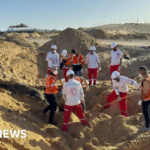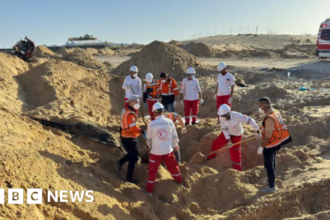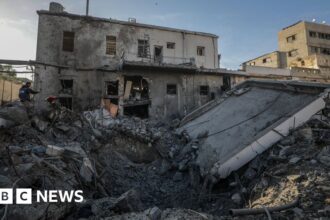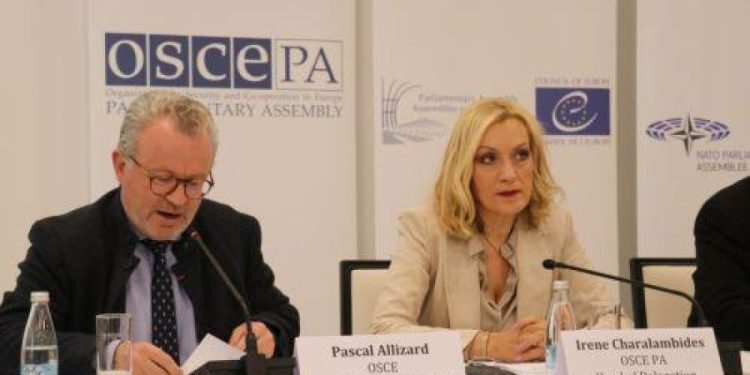International observers report that Georgia’s election was marred by tension, pressure, and an uneven playing field. However, voters had a wide range of choices.
International observers in a recent statement said that while voters had a choice of 18 candidate lists, and candidates were able to campaign freely, the Georgian parliamentary elections were marred with entrenched polarization, concerns about recently adopted legislation, its impact on civil society and fundamental freedoms, as well as divisive rhetoric during campaigning and widespread reports on pressure on voters.
The joint OSCE Office for Democratic Institutions and Human Rights, the OSCE Parliamentary Assembly, the Parliamentary Assembly of the Council of Europe(PACE), the NATO Parliamentary Assembly and the European Parliament (EP), observed a deepening of political divisions as well as a significant financial imbalance and the many benefits taken by the ruling parties contributed to an uneven playing field. In the lead-up to the election, a number of civil society organizations reported the stigmatizing effect of the “law on transparency of external influence”, as well as incidents of intimidation and attacks. Along with potential sanctions if they do not comply with the law, this has also affected their ability to perform their work without undue stress.
“Imbalances of financial resources, a divisive atmosphere in the campaign, and recent legislative changes were significant concerns throughout this election process,” said Pascal Allizard. He is Special Co-ordinator, and leader of OSCE’s short-term observers mission. “Yet, the engagement shown on the day of the election–from active voter participation to the robust presence of citizen and political observers, and the rich diversity of voices –gives a sign of a growing and evolving system with a democratic vitality in construction.”
Observers found that the legal framework was adequate for holding democratic election. Recent amendments have reversed some positive changes, but several long-standing recommendations remain unaddressed. The earlier amendments were adopted after inclusive public discussions. However, frequent revisions – including some made just before the elections without widespread cross-party support – undermined the stability of the law and raised concerns over the potential to misuse the changes for political gain. The effectiveness of campaign finance supervision was also undermined by the limited enforcement of the law and concerns about the impartiality and politicization of the oversight body.
“These elections were marked with high polarization in the political and media landscapes, hate speech towards the opposition and civil society, and antagonism toward the office of President,” said Iulian Bulai. “The quality of these elections reflected that of the pre-election period. We express our concern about the electoral conditions. In light of the widespread pressure and intimidation by parties and groups, particularly in rural areas and the cases of vote buying, we are concerned about the unlevel playing field, which undermines the trust in the results and explains the reactions. These issues must be addressed by the authorities.”
Despite the constitutional obligation to ensure equality between men and women, changes in law made this year undermined this goal and led to an important decline in the number on women’s party lists. The party programs did not include messages that targeted women, and there were few women featured in their campaigns. Women politicians in Georgia still face deep-rooted stereotypes, and sometimes violence.
“While we applaud the largely peaceful elections, the decline of female candidates due the removal of gender quotas, is a setback to diversity, especially since women’s active involvement at polling stations highlights the importance of their role and demands for greater representation,” stated Pia Kauma. Head of the OSCE PA delegaion. “With the recent passage of the Law on Transparency of Foreign Influence I hope that its implications for freedom of expression and association will be reevaluated by the next parliament in order to protect the vital work of civil society in Georgia and make sure all voices are heard.”
The election administration conducted the elections well, but public perceptions of its impartiality were damaged by concerns over recent changes to its nomination and decision making processes, and perceived links between members who did not have formal political affiliations and the ruling party. The election administration took great care to educate voters about the use of electronic devices in the majority of polling stations. Election day was generally orderly and well-organized, but there was a tense atmosphere. The secrecy surrounding the vote was often compromised, and there were reports about intimidation and pressure being applied to voters.
“Respecting the shared values of individual freedom, democracy and rule of law is a condition essential for becoming a NATO Member.” Faik Oztrak is the head of the NATO PA delegation. He said that this election was a critical test for Georgian democracy and its aftermath would be another. “It’s my duty to report on these elections, from election administration to intimidation of voters and pressure on them,” said Faik Oztrak, Head of the NATO PA delegation.
The campaign was competitive, but subdued. However, the language and imagery were divisive. During the election campaign, representatives of the ruling party made public statements about the intention to ban certain opposition parties. Observers noted reports of intimidation and coercion of voters, especially public sector employees and others, raising concerns over the ability of some to vote without fear.
“We continue to be deeply concerned about the democratic backsliding that is occurring in Georgia.” Antonio Lopez-Isturiz White is the head of the EP delegation. He said that yesterday’s election was unfortunately proof of this. “We will continue closely following the situation in Georgia, to see if next government decides to realign itself with EU values and standards and reverse the negative trends of the last few months.”
Georgia’s media landscape is diverse, but polarized. It depends on funding from political actors. The media monitoring conducted by the mission revealed a clear political bias in all media outlets, while commercial television ignored legal obligations to provide impartial news coverage. The public broadcaster covered candidates in a mostly positive or neutral tone, but it spent significantly more time on the ruling party. The safety of journalists is also a major concern after a series recent assaults, intimidation, and pressure.
Eoghan Murphry, the head of the ODIHR’s election observation mission, said that while the campaign gave voters a lot of choice, it was not enough to ensure an election that adhered to international democratic principles. “The deep polarization of the country, the excessive pressure on voters and civil societies, and the tension we saw on the day of the election demonstrate that there is still much work to be done.”
The international election monitoring mission to the parliamentary polls in Georgia consisted of 529 observers from 42 different countries. This included 380 experts, long-term and short-term observers from ODIHR, 60 parliamentarians, staff and members from the OSCE PA and PACE, 39 from NATO PA and 38 from the EP.
Read More @ georgiatoday.ge













